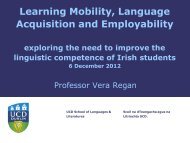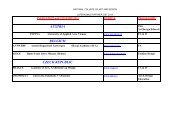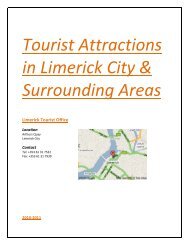See the National Diploma Supplement Template - Europass
See the National Diploma Supplement Template - Europass
See the National Diploma Supplement Template - Europass
You also want an ePaper? Increase the reach of your titles
YUMPU automatically turns print PDFs into web optimized ePapers that Google loves.
DIPLOMA SUPPLEMENT<br />
This <strong>Diploma</strong> <strong>Supplement</strong> follows <strong>the</strong> model developed by <strong>the</strong> European Commission, Council of Europe and UNESCO/CEPES. The<br />
purpose of <strong>the</strong> supplement is to provide sufficient independent data to improve <strong>the</strong> international ‘transparency’ and fair academic and<br />
professional recognition of qualifications (diplomas, degrees, certificates etc.). It is designed to provide a description of <strong>the</strong> nature,<br />
level, context, content and status of <strong>the</strong> studies that were pursued and successfully completed by <strong>the</strong> individual named on <strong>the</strong> original<br />
qualification to which this supplement is appended. It should be free from any value judgements, equivalence statements or<br />
suggestions about recognition. Information in all eight sections should be provided. Where information is not provided, an explanation<br />
should give <strong>the</strong> reason why.<br />
1 INFORMATION IDENTIFYING THE<br />
HOLDER OF THE QUALIFICATION<br />
1.1 Surname<br />
1.2 First Name(s):<br />
1.3 Date of birth (day/month/year):<br />
1.4 Student identification number or code<br />
(if available):<br />
_________________________________<br />
2 INFORMATION IDENTIFYING THE<br />
QUALIFICATION<br />
2.1 Name of qualification and (if applicable) title<br />
conferred:<br />
2.2 Main field(s) of study for <strong>the</strong> qualification:<br />
2.3 Name and status of awarding institution (in<br />
original language):<br />
2.4 Name and status of institution (if different<br />
from 2.3) administering studies (in original<br />
language):<br />
2.5 Language(s) of instruction /examination:<br />
_________________________________<br />
3 INFORMATION ON THE LEVEL OF<br />
THE QUALIFICATION<br />
3.1 <strong>National</strong> Framework of Qualifications level<br />
and award-type:<br />
3.3 Access requirement(s):<br />
_________________________________<br />
4 INFORMATION ON THE<br />
CONTENTS AND RESULTS GAINED<br />
4.1 Mode of study:<br />
4.2 Programme requirements:<br />
4.3 Please see last page<br />
4.4 Grading scheme and, if available, grade<br />
distribution guidance:<br />
4.5 Overall classification of <strong>the</strong> qualification (in<br />
original language):<br />
_________________________________<br />
5 INFORMATION ON THE FUNCTION<br />
OF THE QUALIFICATION<br />
5.1 Access to fur<strong>the</strong>r study:<br />
5.2 Professional status (if applicable):<br />
_________________________________<br />
6 ADDITIONAL INFORMATION<br />
6.1 Additional information:<br />
6.2 Fur<strong>the</strong>r information sources:<br />
3.2 Official length of programme:
4.3 Programme details (e.g. modules or units studied), and <strong>the</strong> individual grades/marks/credits obtained:<br />
*Marks out of 100%; Pass Marks generally 40% **The ECTS grade is a relative grading indicating <strong>the</strong><br />
learner’s performance within <strong>the</strong> cohort;<br />
A top 10%; B next 25%; C next 30%; D next 25%; E next 10%.<br />
CODE SUBJECT STAGE MARKS* ECTS CREDITS ECTS GRADE**<br />
7 CERTIFICATION OF THE SUPPLEMENT<br />
7.1 Date: 7.2 Signature: 7.3 Capacity: 7.4 Official stamp or seal:
Section 8:<br />
DESCRIPTION OF HIGHER EDUCATION AND TRAINING SYSTEM IN IRELAND<br />
As at February 2009<br />
The Irish higher education and training system comprises of a range of higher education institutions –<br />
Universities, Institutes of Technology, o<strong>the</strong>r nationally recognised institutions and independent higher<br />
education colleges. The Department of Education and Science maintains a list of Higher Education<br />
institutions in Ireland, which provide higher education and training programmes leading to awards included<br />
in <strong>the</strong> <strong>National</strong> Framework for Qualifications (NFQ). These institutions offer a wide range of different<br />
types and levels of awards. Entry to higher education and training is on a controlled basis with <strong>the</strong> most<br />
common entry point being completion of <strong>the</strong> Leaving Certificate, a State examination taken at <strong>the</strong> end of<br />
second level education. In recent years, <strong>the</strong>re has been an increase in <strong>the</strong> availability of alternative access<br />
routes into higher education and training.<br />
Government Agencies<br />
The Higher Education Authority (www.hea.ie) is responsible for fur<strong>the</strong>ring <strong>the</strong> development and assisting<br />
in <strong>the</strong> co-ordination of State investment in higher education and training, including research. The <strong>National</strong><br />
Qualifications Authority of Ireland (NQAI) (www.nqai.ie) is responsible for establishing and maintaining<br />
<strong>the</strong> <strong>National</strong> Framework of Qualifications (NFQ). The Higher Education and Training Awards Council<br />
(HETAC) (www.hetac.ie) is <strong>the</strong> awarding body and quality assurance agency for <strong>the</strong> Institutes of<br />
Technology, (o<strong>the</strong>r than <strong>the</strong> Dublin Institute of Technology (DIT)) and o<strong>the</strong>r higher education and training<br />
providers outside <strong>the</strong> university sector.<br />
Higher Education Institutions<br />
There are seven Universities recognised under State legislation. The Universities make <strong>the</strong>ir own awards<br />
and validate programmes in institutions recognised by <strong>the</strong>m. They provide programmes of study leading to<br />
awards included at NFQ Levels 7-10 and engage in basic and applied research. The Universities have<br />
primary responsibility for <strong>the</strong>ir own quality assurance systems. They established <strong>the</strong> Irish Universities<br />
Quality Board (IUQB) (www.iuqb.ie) which has delegated authority as an independent body, to organise<br />
<strong>the</strong> periodic review of <strong>the</strong> effectiveness of <strong>the</strong> quality assurance procedures in place in <strong>the</strong> Universities as<br />
required by State legislation. The HEA also has a review role in relation to quality assurance procedures in<br />
Universities.
There are thirteen Institutes of Technology (IoT) which are designated under State legislation. They<br />
provide programmes leading to awards at NFQ Levels 6 - 10. The Institutes of Technology make <strong>the</strong>ir own<br />
awards at specified levels under delegated authority from HETAC.<br />
The Dublin Institute of Technology (DIT) has <strong>the</strong> authority to make its own awards at NFQ Levels 6 - 10.<br />
While DIT has primary responsibility for <strong>the</strong> implementation of quality assurance procedures, <strong>the</strong> NQAI<br />
has a statutory quality review role in relation to <strong>the</strong>se procedures.<br />
O<strong>the</strong>r providers of higher education and training may apply to HETAC for approval of <strong>the</strong>ir quality<br />
assurance procedures and subsequent validation of <strong>the</strong>ir programmes. While such providers have primary<br />
responsibility for quality assurance, HETAC has a statutory role in quality assurance monitoring and<br />
review. Fur<strong>the</strong>rmore, any person may apply to HETAC for an award based on <strong>the</strong>ir lifelong learning<br />
achievement without reference to a programme of higher education and training.<br />
The European Credit Transfer and Accumulation System (ECTS) has been incorporated into <strong>the</strong> awards<br />
systems of HETAC, <strong>the</strong> Institutes of Technology, DIT and <strong>the</strong> Universities and most programmes are<br />
ECTS compatible. ECTS is a learner-centred system for credit accumulation and transfer based on <strong>the</strong><br />
transparency of learning outcomes and learning processes. It aims to facilitate planning, delivery,<br />
evaluation, recognition and validation of qualifications and units of learning as well as student mobility.<br />
<strong>National</strong> Framework of Qualifications (NFQ)<br />
In terms of higher education and training, <strong>the</strong> NFQ sets <strong>the</strong> overall standards for all higher education and<br />
training awards. It is <strong>the</strong> single, nationally and internationally accepted entity, through which all learning<br />
achievements may be measured. It also defines <strong>the</strong> relationship between all education and training awards.<br />
It is a 10-level framework based on learning outcomes that are determined by standards of knowledge, skill<br />
and competence. Higher education and training awards are at NFQ Levels 6 to 10 and may be made by<br />
HETAC, DIT, <strong>the</strong> Universities and Institutes of Technology with delegated authority. The framework<br />
consists of 16 major award types with minor and special purpose awards available at each level and<br />
supplemental awards available at NFQ Levels 4 to 10. All awards included in <strong>the</strong> Framework are<br />
underpinned by legislative quality assurance arrangements. The major awards of <strong>the</strong> NFQ are set out<br />
below toge<strong>the</strong>r with <strong>the</strong> alignment to <strong>the</strong> ‘Bologna’ Framework and <strong>the</strong> draft alignment to <strong>the</strong> European<br />
Qualifications Framework (EQF):
EQF Level**<br />
EHEA Framework<br />
(Bologna)*<br />
<strong>National</strong> Framework of<br />
Qualifications (NFQ)<br />
NFQ Major Award-<br />
Types<br />
Level<br />
EQF Level 1 NFQ Level 1 Level 1 Certificate<br />
NFQ Level 2<br />
Level 2 Certificate<br />
EQF Level 2 NFQ Level 3 Level 3 Certificate;<br />
Junior Certificate<br />
EQF Level 3 NFQ Level 4 Level 4 Certificate;<br />
Leaving Certificate<br />
EQF Level 4 NFQ Level 5 Level 5 Certificate;<br />
Leaving Certificate<br />
EQF Level 5<br />
Short Cycle within First<br />
Cycle<br />
NFQ Level 6<br />
Advanced Certificate<br />
(VET award); Higher<br />
Certificate (HET award)<br />
EQF Level 6 First Cycle NFQ Level 7 Ordinary Bachelor<br />
Degree<br />
NFQ Level 8<br />
Honours Bachelor<br />
Degree; Higher <strong>Diploma</strong><br />
EQF Level 7 Second Cycle NFQ Level 9 Masters Degree; Post-<br />
Graduate <strong>Diploma</strong><br />
EQF Level 8 Third Cycle NFQ Level 10 Doctoral Degree; Higher<br />
Doctorate<br />
‘Bologna’ Framework of Qualifications/European Qualifications Framework<br />
*The Bologna Process, which commenced in 1999, is designed to lead to <strong>the</strong> creation of <strong>the</strong> European<br />
Higher Education Area (EHEA) by 2010. A central initiative in <strong>the</strong> process is <strong>the</strong> adoption of a system<br />
based on three cycles – undergraduate, graduate and doctorate. The NFQ was formally aligned with <strong>the</strong><br />
‘Bologna’ Framework in 2006.<br />
**Running parallel to <strong>the</strong> Bologna Process is <strong>the</strong> development of <strong>the</strong> European Qualifications Framework<br />
(EQF) for lifelong learning. Ireland completed <strong>the</strong> process of referencing <strong>the</strong> <strong>National</strong> Framework of<br />
Qualifications to <strong>the</strong> EQF in May 2009 (see referencing outcome above). Alignment facilitates <strong>the</strong><br />
recognition of learning and supports access, transfer and progression for learners.<br />
Please note: Information on <strong>the</strong> Irish <strong>National</strong> Higher Education and Training System is provided by <strong>the</strong><br />
Irish <strong>National</strong> Academic Recognition Information Centre (NARIC), located at <strong>the</strong> offices of <strong>the</strong> <strong>National</strong><br />
Qualifications Authority of Ireland, and can be contacted via e-mail, info@qualrec.ie.


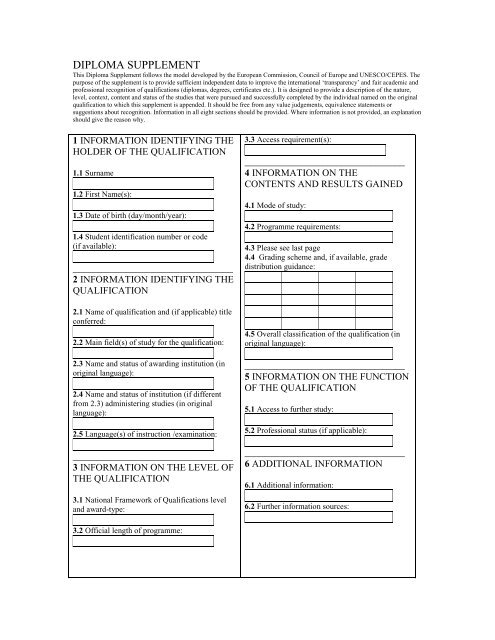
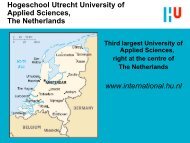
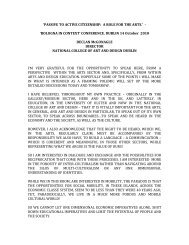

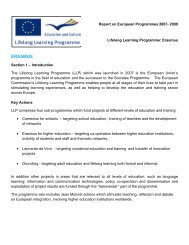
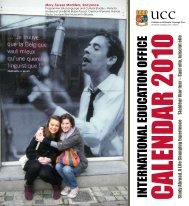

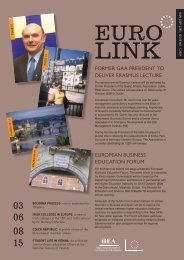
![Fiona Killilea [Compatibility Mode] - EURIreland.ie](https://img.yumpu.com/29112845/1/190x135/fiona-killilea-compatibility-mode-eurirelandie.jpg?quality=85)
